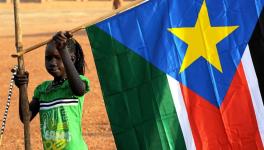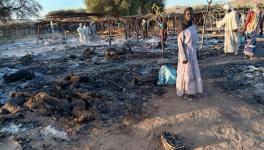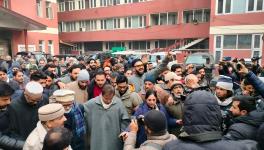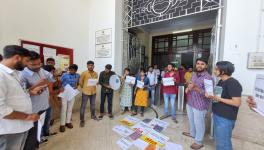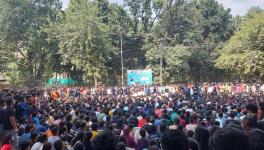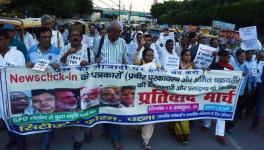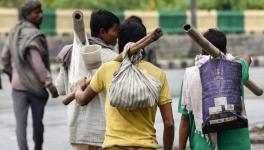More Than one Million Sudanese Take to Streets Against Coup
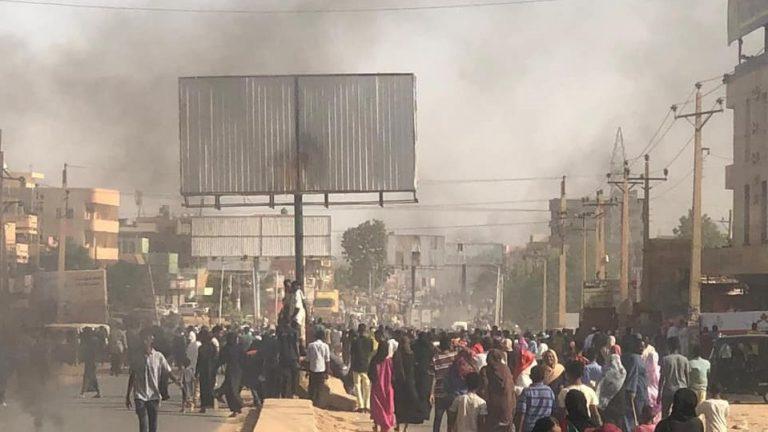
Protesters gather in Sudan against the military coup. Photo: Sudanese Professionals Association
More than a million pro-democracy Sudanese protesters have taken to the streets against the coup staged by General Abdel Fattah al-Burhan, who dissolved the transitional government, arrested Prime Minister Abdalla Hamdok, his wife and several other ministers and declared an emergency on Monday.
Despite the reprisal by the Army, which has killed seven protesters so far, the defiant protesters are still holding on, according to Peoples Dispatch, an international media project that reports on people’s movements and organisations across the globe.
In capital Khartoum, the Army fired at the protesters, who had reached en masse outside its headquarters. Most of the main roads and bridges used to enter or exit the city are reportedly blocked by the soldiers while the protesters have barricaded the roads within.
In Khartoum’s twin city Omdurman, security forces stormed the state radio and television headquarters and detained a number of employees following which the state TV had been reportedly playing patriotic songs and showing images of the Nile. Internet connectivity has been suspended.
Demanding the return of civilian rule, the protesters chanted: “Civilian rule is the people’s choice” while setting up barricades and burning tyres, the BBC reported. Several women protesters chanted: “No to military rule.”
The images of angry protesters raising revolutionary slogans and marching on the main roads over a backdrop of thick black smoke rising from burning tyres blocking the highways in various parts of the country are emerging on social media, despite the net blockade, sources told Peoples Dispatch.
Calling for occupation of the streets, the Sudanese Communist Party (SCP) and its affiliated trade unions and neighbourhood resistance committees declared a political strike and total civil disobedience when the coup began.
According to a statement from the Prime Minister’s office, Hamdok and his wife were “kidnapped from their residence in Khartoum and were led to an unknown destination by a military force”. According to the ministry of information, after surrounding his residence, the military attempted to force him to sign a statement approving its takeover and arrested him upon his refusal to comply.
Other Cabinet ministers and civilian leaders sharing power with the military Generals in the transitional government’s highest body, the Sovereignty Council, were also arrested. According to reports, other leaders in military custody include the council’s spokesperson Mohammed el-Fiky Suliman, Khartoum’s governor Ayman Khalid, industry minister Ibrahim al-Sheikh, information minister Hamza Baloul and PM’s media adviser Faisal Mohammed Saleh.
The Sudanese Professionals Association (SPA) appealed “to the masses of the Sudanese people, their revolutionary forces, and the resistance committees in neighbourhoods in all cities and villages to take to the streets and completely occupy them … and block all roads with barricades”.
Calling for a “comprehensive civil disobedience in all professional and service institutions, except for emergency medical conditions”, the Khartoum University Professors’ Union announced that all the faculty members have joined the strike. The executive committee of the Sudanese Pilots Union also declared a “general strike and civil disobedience” and called on “all pilots and workers in the airfield to take to the streets and protect the Sudanese people’s revolution”. The airport in Khartoum is reportedly closed and international flights have been suspended.
Monday’s coup comes less than a month after a similar attempt by a section of Army officers following which the military had blamed the civilian administration for failing to do its work and causing unrest in the country.
NOT THE END OF DECEMBER REVOLUTION
While the Cabinet ministers and other civilian leaders of the government are in military’s custody and the Army chief has announced his intention to form a new government, it would be premature to declare an end to the December Revolution, which led to the overthrow of long-time dictator Omar al-Bashir in 2019.
The military elite “didn’t understand that the December revolution was rooted in the awareness and will of the Sudanese and that those who guard it are the masses of these people who will defeat today’s adventure … their struggles will not stop without the full transfer of power to civil authority”, the SPA said. Deriding Army chief al-Burhan for being “disconnected from reality”, the SPA said that by attempting to seize power, “Burhan has written his own end” and will face the “wrath of the people”.
However, danger lurks on the road ahead for the revolutionary forces. The “class of Internet disruption” in Sudan “affects connectivity at the network layer and cannot always be worked around with the use of circumvention software or VPNs”, NetBlocks reported. Concerns that atrocities may be committed under the cover of this information blackout are real.
The watchdog added in its report that a “more extensive mobile Internet shutdown [had] left Sudan offline for 36 days from June 3 to July 9, 2019.” June 3, 2019, was the day when the massive sit-in demonstration outside the Army HQ in Khartoum was dispersed with the use of the notorious militia Rapid Support Forces (RSF), which massacred more than 100 protesters.
Following this massacre, the centrist and right-leaning political parties compromised with the military and struck a power-sharing arrangement making way for the transitional government.
Objecting to this compromise, the SCP, SPA and the resistance committees had refused to be part of the government but had continued to exert pressure on the civilian leaders to subjugate the military. They had also mobilised the masses in defence of the government every time it was threatened by a military takeover.
However, as these civilian leaders, backed by the centrist and right-wing parties, continued their hesitation to confront the military, the forces of December Revolution had made it clear during the ‘March of Millions’ last week that the masses will confront the military directly on the streets.
With the government now dissolved, this confrontation has begun.
After the firing outside the Army HQ in Khartoum at the protesters, who had sought to occupy the square where the June 3 massacre was committed, the SPA called on them to “avoid heading to leadership, palace or any other central point at the moment”.
Urging people to instead organise sit-ins in neighbourhoods and block the main roads, the trade unions federation explained, “We need to gather rows in our positions and paralyse the coup movement through the barricades.”
Meanwhile, in a television statement, General al-Burhan vowed that Sudan will be led by a technocratic government, Al Jazeera reported. “The affairs of the country will be run by an independent technocrat government where people of Sudan from all walks of life will be represented,” he said.
Get the latest reports & analysis with people's perspective on Protests, movements & deep analytical videos, discussions of the current affairs in your Telegram app. Subscribe to NewsClick's Telegram channel & get Real-Time updates on stories, as they get published on our website.









